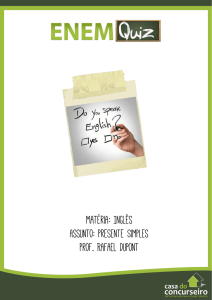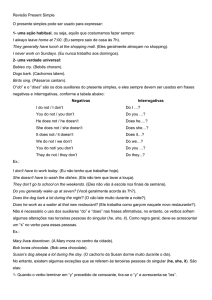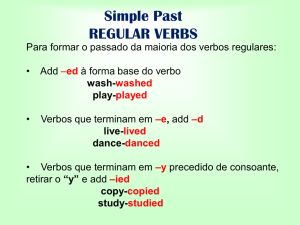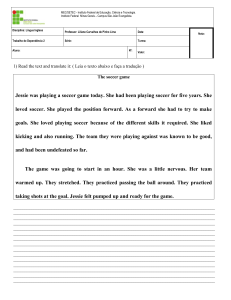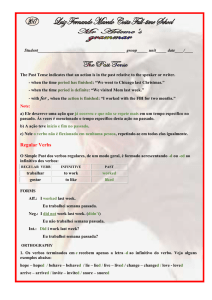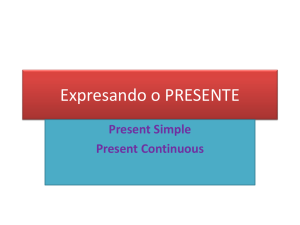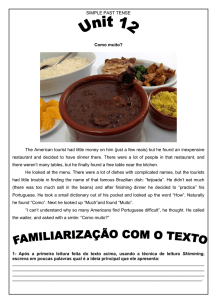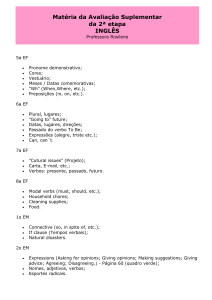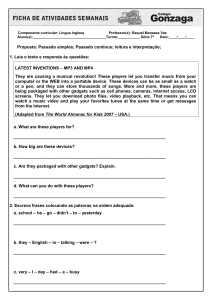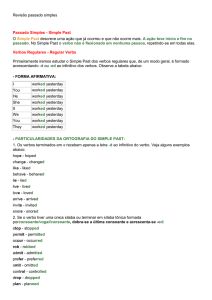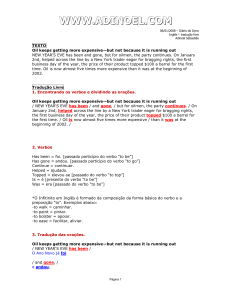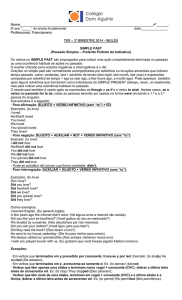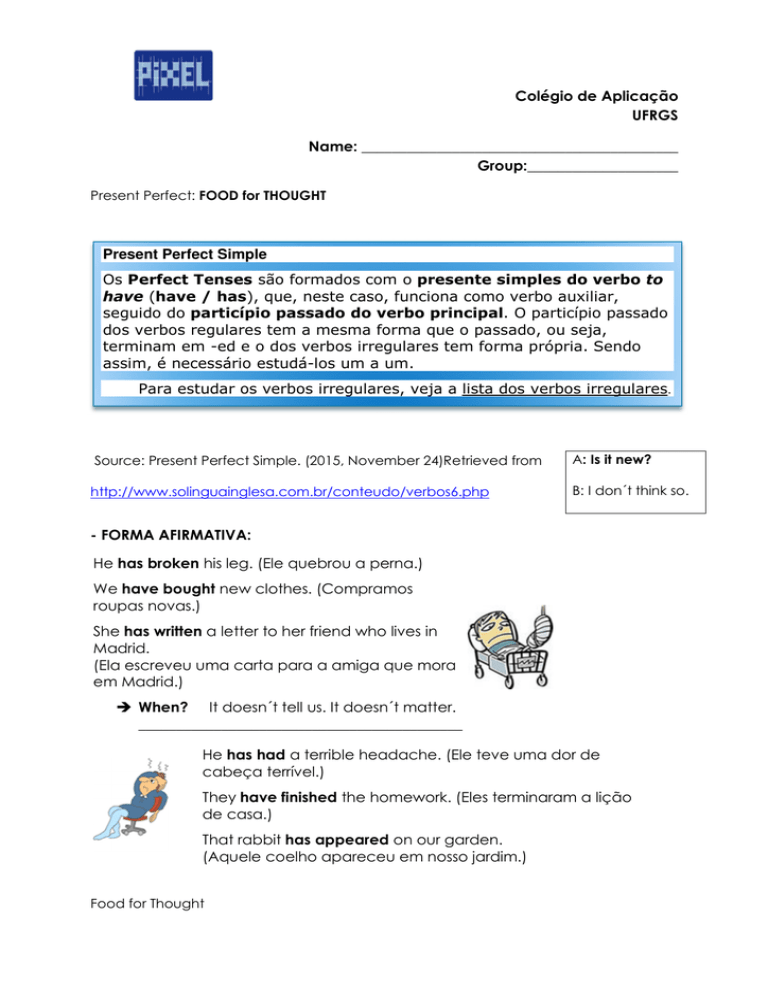
Colégio de Aplicação
UFRGS
Name: __________________________________________
Group:____________________
Present Perfect: FOOD for THOUGHT
Present Perfect Simple
Os Perfect Tenses são formados com o presente simples do verbo to
have (have / has), que, neste caso, funciona como verbo auxiliar,
seguido do particípio passado do verbo principal. O particípio passado
dos verbos regulares tem a mesma forma que o passado, ou seja,
terminam em -ed e o dos verbos irregulares tem forma própria. Sendo
assim, é necessário estudá-los um a um.
Para estudar os verbos irregulares, veja a lista dos verbos irregulares.
Source: Present Perfect Simple. (2015, November 24)Retrieved from
A: Is it new?
http://www.solinguainglesa.com.br/conteudo/verbos6.php
B: I don´t think so.
- FORMA AFIRMATIVA:
He has broken his leg. (Ele quebrou a perna.)
We have bought new clothes. (Compramos
roupas novas.)
She has written a letter to her friend who lives in
Madrid.
(Ela escreveu uma carta para a amiga que mora
em Madrid.)
When? It doesn´t tell us. It doesn´t matter.
___________________________________________
He has had a terrible headache. (Ele teve uma dor de
cabeça terrível.)
They have finished the homework. (Eles terminaram a lição
de casa.)
That rabbit has appeared on our garden.
(Aquele coelho apareceu em nosso jardim.)
Food for Thought
AFFIRMATIVE FORM: SUJEITO + PRESENTE SIMPLES DO VERBO TO HAVE +
PARTICÍPIO PASSADO DO VERBO PRINCIPAL
* FORMA CONTRAÍDA: I / You / We / You / They' ve - He / She / It' s.
Veja alguns exemplos com as formas contraídas:
He's studied law. (He has studied law.)
(Ele estudou Direito.)
She's been here. (She has been here.)
(Ela esteve aqui.)
We've worked a lot. (We have worked a lot.)
(Nós trabalhamos muito.)
I've broken a glass. (I have broken a glass.)
(Eu quebrei um copo.)
She's given birth to a boy. (She has given bith to a boy.)
(Ela deu a luz a um menino.)
- FORMA INTERROGATIVA:
Na Forma Interrogativa do Present Perfect, o verbo have/has, que funciona
como verbo auxiliar, posiciona-se antes do sujeito:
Have you already talked to your boss? (Você já falou
com o seu chefe?)
Have they lived in Amsterdam? (Eles moraram em
Amsterdã?)
Has she brought the English/Portuguese dictionary?
(Ela trouxe o dicionário de Inglês/Português?)
Has he found his wallet? (Ele encontrou a carteira
dele?)
Have you ever been in the United States?
(Você ja esteve nos Estados Unidos?)
Has she solved the problem yet? (Ela já resolveu o problema?)
Have they gone out? (Eles saíram?)
INTERROGATIVE FORM: PRESENTE SIMPLES DO VERBO TO HAVE + SUJEITO +
PARTICÍPIO PASSADO DO VERBO PRINCIPAL
- FORMA NEGATIVA:
A Forma Negativa do Present Perfect forma-se acrescentando not ao verbo
auxiliar have/has:
They have not heard what I've told. (Eles não escutaram o que eu falei.)
You have not eaten anything so far. (Você não comeu nada até agora.)
We have not done our homework. (Não fizemos nossa lição de casa.)
NEGATIVE FORM: PRESENTE SIMPLES DO VERBO TO HAVE + NOT +
PARTICÍPIO PASSADO DO VERBO PRINCIPAL
* FORMA CONTRAÍDA: haven't / hasn't
I haven't gone to the beach, I've gone to the countryside. (Não fui para a praia,
fui para o interior.)
She hasn't told to her parents where she's been all day.
(Ela não disse aos pais onde esteve durante todo o dia.)
We haven't seen this movie yet. (Ainda não vimos este filme.)
Susan hasn't bought a car. (Susan não comprou um carro.)
They haven't believed her. (Eles não acreditaram nela.)
Learning Record: I´ve learned ______________________________________________
____________________________________________________________________________
I´m not sure ________________________________________________________________
___________________________________________________________________________
I don´t agree with the material
______________________________________________________________________________
______________________________________________________________________________
2. Exercises
Verb Tenses Revision
1. I know Alice _______ in the garden at this moment.
a) has worked
b) is working
c) works
d) was working
e) has been working
2. Our English teacher ______ (to spend) the afternoon reading yesterday.
a) spended
b) was spent
c) spent
d) has spent
e) did spend
3. I _________ a new car.
a) bought
b) did buy
c) have bought
d) buy
e) had bought
4. They ______________ here for 10 years.
a) work
b) working
c) has worked
d) have worked
e) have work
MY FINAL CONCLUSIONS …
When?
WHY?
HOW?
My examples
This section is based on personal experience. Answer these questions, then write
a small paragraph about you. Thank you.
How long have you lived in Porto Alegre/Viamão?
How long have you studied at CAp UFRGS?
How long have you studied English? (since Macrch/ for 9 months)
How long have supported Inter/Grêmio?
My name´s
_________________________________________________________________________
_____________________________________________________________________________________
_____________________________________________________________________________________
_____________________________________________________________________________________
_____________________________________________________________________________________
_____________________________________________________________________________________
_____________________________________________________________________________________
_____________________________________________________________________________________
_____________________________________________________________________________________
_____________________________________________________________________________________
KEY to exercises:
1. B
O Present Continuous expressa uma ação que está ocorrendo no
momento em que se fala. A expressão "at this moment" nos indica
que a ação está ocorrendo no momento da fala.
2. C
O Simple Past é usado para indicar eventos, ações ou situações
que ocorreram em um tempo definido no passado. O advérbio
"yesterday" nos indica que a ação ocorreu em um determinado
momento do passado e que não ocrre mais.
3.C
Neste caso devemos usar o Present Perfect, pois a ação ocorreu
em um tempo indefinido do passado. Não há informação
alguma que nos indique que a ação ocorreu em um tempo
definido do passado ou presente. Obs.: na fala informal, o
Simple Past (bought) também é utilizado.
4.D
O Present Perfect também pode ser empregado para expressar
um passado não acabado, ou seja, a ação começou no passado
e continua até o presente. Portanto, neste caso, devemos usar o
Present Perfect.
Teacher for 20 minutes or so. Think of a context and adapt from a
Grammar Book (The Richmond Simplified Grammar Of English/ in room 221) a
couple of exercises (2 or 3) to exchange with a classmate:
Affirmative Form
Negative Form
Interrogative Form

